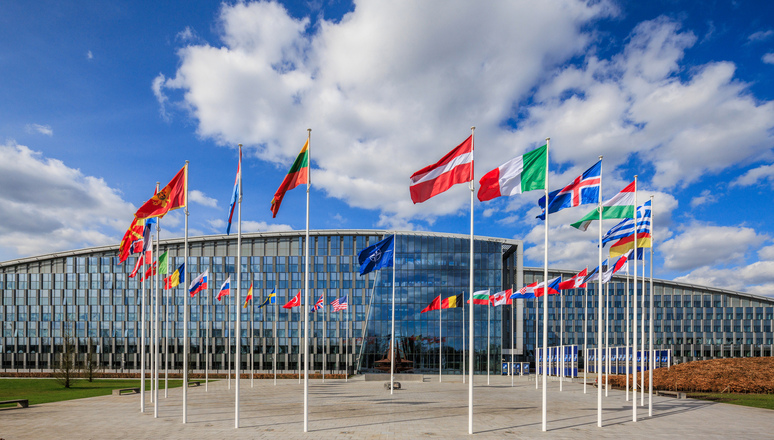National delegations to NATO
Each NATO member country has a delegation at NATO Headquarters in Brussels, Belgium. These are the national representations of the individual Allies at the heart of the Alliance. They enable each member country to contribute to the consultation process, which allows NATO to take collective decisions or actions.

- A delegation represents its country at NATO and has a status similar to that of an embassy.
- It is headed by an "ambassador" (also called "permanent representative"), who acts on instructions from their capital and reports back to the national authorities.
- With all the delegations in the same building, they are able to maintain formal and informal contacts with each other, as well as with NATO's International Staff and International Military Staff.
- Delegations can vary in size and are principally staffed with civil servants from the Ministries of Foreign Affairs and Defence.
Roles and responsibilities
Representing its member country
The responsibility and task of each delegation is to represent its member country at NATO. The authority of each delegation comes from its home country's government. It acts on instruction from its capital and reports back on NATO decisions and projects.
Each member country is represented on every NATO committee, at every level. At the top, each member country is represented on the North Atlantic Council , the principal political decision-making body within NATO, by an ambassador.
The ambassadors are supported by their national delegations, composed of advisers and officials who represent their country on different NATO committees, which are subordinate to the North Atlantic Council. Delegations can also be supported by experts from capitals on certain matters.
Contributing to the consultation process
An important function of the delegations at NATO Headquarters is to contribute to the consultation process.
Consultation among the delegations can take place in many forms, from the exchange of information and opinions to the communication of actions or decisions that governments have already taken or may be about to take, and which have a direct or indirect bearing on the interests of Allies. Consultation is ultimately designed to enable member countries to arrive at mutually acceptable agreements on collective decisions or on action by the Alliance as a whole.
The participants
The delegation is headed by an ambassador, who is appointed by their government for a period ranging between one to eight years.
The staff of a delegation can vary considerably in size, from the smallest at under half a dozen to the largest at about 200. It comprises civil servants from the Ministry of Foreign Affairs, the Ministry of Defence and other relevant ministries. The International Staff and International Military Staff at NATO Headquarters support the work of the delegations.
As set out in the "Agreement on the Status of NATO, National Representatives and International Staff" (signed in Ottawa in 1951), all members of national delegations shall enjoy the same immunities and privileges as diplomatic representatives. These include: immunity from personal arrest or detention; immunity from legal process in respect of words spoken or written or acts done in an official capacity; and inviolability for all papers and documents. A full list of privileges and immunities can be found in Article XIII of the agreement.
